
Reetika’s father, a dental surgeon and professor, had also committed suicide when she was 11. Her mother had remarried after husband’s death. Reetika’s marriage too couldn’t last and later she gave birth to a son from a person she never married.
Sindh Courier
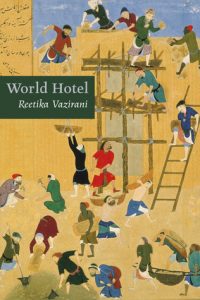 Reetika Vazirani, born to a Sindhi father and Bengali mother, was a prize-winning poet who died tragically at the age of forty on July 16, 2003. The year Vazirani died, the second of her two collections ‘World Hotel’ (2002), in which the poem “Daughter-Mother-Maya-Seeta” appears, received the Anisfield-Wolf Book Award.
Reetika Vazirani, born to a Sindhi father and Bengali mother, was a prize-winning poet who died tragically at the age of forty on July 16, 2003. The year Vazirani died, the second of her two collections ‘World Hotel’ (2002), in which the poem “Daughter-Mother-Maya-Seeta” appears, received the Anisfield-Wolf Book Award.
Reetika Vazirani’s poem “Daughter-Mother-Maya-Seeta” focused on a mother figure, very possibly the poet’s own mother. Indeed, Vazirani used the name Maya to denote her mother in previous poems. This poem was written before the poet conceived her son, which supports the assumption that she describes her own mother, who had given birth to a son and several daughters and was a widow, as is the speaker in the poem. No matter to whom the poet refers, the speaker is a mother, recounting her life experiences.
“Daughter-Mother-Maya-Seeta” was first published in Prairie Schooner in 1998. It was reprinted in The 2000 Pushcart Prize Anthology, The New American Poets (2000), and Vazirani’s second book of poetry, World Hotel.
“I have been desperate, silent, silenced, alone, hungry, angry, and crushed” – Reetika had said in a letter written in 2003
She was a recipient of Barnard New Women Poets Prize for White Elephants (1996), “Discovery”/The Nation Award, a Pushcart Prize, the Poets & Writers Exchange Program Award, and the Glenna Luschei/Prairie Schooner Award for her essay, “The Art of Breathing,” which appeared in the anthology How We Live our Yoga (2001). She had been a Contributing and Advisory Editor for Shenandoah and was the guest poetry editor of two issues. She was a Book Review Editor for Callaloo and a Senior Poetry Editor of Catamaran, a journal featuring work by artists from South Asia. She translated poetry from Urdu and had some her poems translated into Italian. She contributed a poem, Mouth-Organs and Drums, to a “Poets against War” anthology.
 Birth in India, migration to USA
Birth in India, migration to USA
Vazirani was born in Patiala, Punjab, India on August 9, 1962, to Sundar J. Vazirani, a talented and ambitious dentist, an Oral Surgeon in fact, and Heea (Maiden name Halder) a lady diplomat. But her parents immigrated to the United States in 1968 along with children. She grew up in Maryland and, as a child, took ballet lessons and ran on her high school track team. Vazirani attended Wellesley College for her undergraduate degree and then the University of Virginia, where she earned a master of fine arts degree. After graduating from Wellesley College in 1984, she received a Thomas J. Watson Fellowship to travel to India, Thailand, Japan, and China. She also received an M.F.A. from the University of Virginia as a Hoyns Fellow.
After earning a master’s degree from the University of Virginia, Vazirani worked hard to establish herself in the most prestigious literary circles. Her poetry appeared in The Best American Poetry 2000, The Kenyon Review, The Nation and the Paris Review. Her first book, “White Elephants,” earned her a Barnard New Women Poet Prize in 1996.
Vazirani’s father had wanted his daughter to become a physician, but Vazirani found that her passions pulled her toward the written word. Once she latched on to poetry, Vazirani focused on improving her skills, getting her work published, and gaining the notice of a literary audience. She began to realize her goals and supported herself through teaching. Vazirani’s first poetry collection, White Elephants (1996), was honored with the Barnard New Women Poets Prize.
Vazirani led a somewhat typical middle-class life, but she seemed troubled. Many of her poems deal with the topic of otherness, as if she felt that she was part of no particular group with which she could identify, either in her adopted land or the country of her parents.
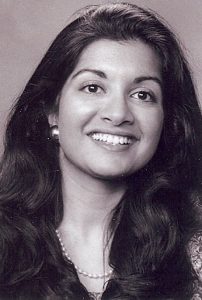 Follows father to end her life
Follows father to end her life
When Vazirani was eleven years old, her father, a Professor of Dentistry at Howard University, committed suicide. Paula Span notes in “The Failing Light” that in 2003, Vazirani wrote a letter to the poet Rita Dove, her former teacher, telling Dove: “I have been desperate, silent, silenced, alone, hungry, angry, and crushed.” Vazirani used these words to describe her experiences of pregnancy and motherhood and her relationship with the father of her son, the poet Yusef Komunyakaa. Although Komunyakaa supported the boy, he and Vazirani never married and lived together only a short time. They were estranged at the time of Vazirani’s death, but it is unclear whether the estrangement was the cause of Vazirani’s depression.
Vazirani led a somewhat typical middle-class life, but she seemed troubled. Many of her poems deal with the topic of otherness, as if she felt that she was part of no particular group with which she could identify, either in her adopted land or the country of her parents.
On July 18, 2003, a friend found the bodies of Vazirani and her 15-month-old son on the dining room floor of the house in which Vazirani was temporarily living. Both the child and the poet had wounds. Telephone messages and notes were later found, indicating that Vazirani had killed her son and herself.
The report said that Vazirani and her 15-month-old son, Jehan, were found dead with their wrists slashed in the Maryland home of novelist Howard Norman. A note and two large kitchen knives were reportedly obtained by police at the scene. Vazirani also left a message on a friend’s voice mail that said, “I think I’m going to hurt myself.” The note found from the scene was with references to the boy’s father, Pulitzer prize-winning poet and Princeton University professor Yusef Komunyakaa.
Police called the deaths an apparent murder-suicide, pending an official ruling, The Washington Post had reported quoting sources.
Neighbors and friends told reporters that there had been signs that Vazirani was distraught.
Reetika portrays life in America in a poem
The family moved around quite a bit, a dozen times as Reetika was growing up in America, getting adjusted to a new land, new life, and a new herself. The little girl had strong impressions of growing up to become a teenager in those days, most famously described in this often quoted poem:
“Daddy always cautioned me
How many rupees it took to get
A dollar; and when I bought my first
Chanel lipstick, it was as if
I might have bought a cow in India.
It was always like that-what I
Could have had were we in Delhi.
So that on holiday at Reno Road
He’d hint that Washington was not
Like home. That’s why he didn’t want
Me window-shopping downtown”
Darkness in Life
Tragedy seems to have struck Reetika early. A certain darkness was with her, her whole life. She was a gifted person, sensitive, smart and talented. She was fluent in English, French and Hindi, but was never quite comfortable in any particular culture or sure of what life had in store for her. She tried the sciences, she tried the humanities, and only perchance ended up a poet.
Her life ended tragically, horribly. It wasn’t merely that she took her own life, she also took away the life of the one she gave life to.
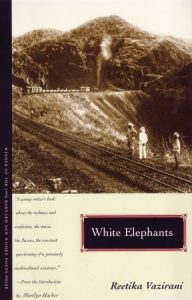 Jane Albertson, a biographer of Reetika, says, “In the 2003 Poets and Writers interview, Vazirani continued to explain that until she was 26, she was emotionally numb, having no sense that there was a place for me in the world except in books”. Though her father’s suicide was, in Reetika’s terms, a “complete rejection,” his act begins Vazirani’s journey toward definition, not a place for her in the world, but a way to live in the world that doesn’t want you”.
Jane Albertson, a biographer of Reetika, says, “In the 2003 Poets and Writers interview, Vazirani continued to explain that until she was 26, she was emotionally numb, having no sense that there was a place for me in the world except in books”. Though her father’s suicide was, in Reetika’s terms, a “complete rejection,” his act begins Vazirani’s journey toward definition, not a place for her in the world, but a way to live in the world that doesn’t want you”.
For Vazirani, the intellectual space of the migrant experience and the physical space of the migrant body cannot be metabolized. She says in her essay, ‘The Art of Breathing’, “I didn’t have the cultural confidence to be proud…I felt like a foreigner in my home”.
“In Vazirani, we find the immigrant confronting and conjoining those spaces, those weighty silences alive in the unspoken anxiety of the Indian living in the West, and, importantly, living the West,” Jane said.
In the community of poets, her work was widely read and respected.
Ms. Paula Span, an author and on death, dying, and suicide wrote an insightful article for Washington Post Magazine, A Failing Light. That article proved to be so popular, there was an online live chat with Span. Span weaves a narrative combining Reetika’s life story – the most detailed biographical sketch yet – and literary endeavors, with hints at the forces at play in the inner life of the struggling poet.
After her father’s death and her mother’s remarriage four years later, Reetika spent a long time feeling “numb,” she told Renee Shea, who interviewed her for Poets Writers magazine in 2002. “I had no sense that there was a place for me in the world except in books.”
The letters she wrote her friend and adviser E. Ethelbert Miller in the late ’80s and ’90s show her struggling to get noticed, to get published, to connect with the world of culture and literature where she clearly felt she belonged.
She was living, instead, with her husband, John Jordan — a family friend and aspiring musician she’d married in 1989 — in Nashville and then Blacksburg, Va. She was sending her submissions to small literary journals, getting turned down, sending them out again, all the while scrounging for money for postage and photocopying.
Read poetry of Reetika Vazirani
By 1994, important publications had begun to accept her work, but she still sounded frustrated. To make ends meet, she’d been working at Pier Imports, then at a bookstore; she taught English at private schools. Restive in her marriage (it ended in 1997), she was starting to think about the graduate writing program at U-Va. “I guess it’s partly the panic of being 32 having no job, no future,” she fretted in a postcard.
Though she and Komunyakaa never married (she told friends that he was willing but she’d declined), she did want to give their relationship every chance, to give Jehan a family. She left Sweet Briar a year earlier than planned and moved into Komunyakaa’s big old house in Trenton in the spring of 2001. But the place seemed “cavernous,” she complained; the neighborhood felt dangerous; she was far from friends and family. The relationship — about which she was discreet — evidently wasn’t working. She began to talk about being afraid, though she never said exactly what frightened her.
Despite her reputation for an endearing openness, Reetika was actually selective about her disclosures. She confided lots of details to lots of people, but almost no one knew everything. People who’d felt close to her for years didn’t know about her father’s suicide. Girlfriends outside the literary world sometimes heard more about her relationships than longtime poet friends.
Last days of her life
Sunday, July 13. Reetika — now housesitting in Washington at the comfortable Quesada Street home of poet Jane Shore and novelist Howard Norman — took Jehan to services at Denise King-Miller’s church in Georgetown. She’d been drawn to religion more lately; in Williamsburg, she’d joined a Bible study group. Reetika loved the service, but on the phone with Susan Sears that evening, she was weepy. “She felt hopeless,” Sears says.
Monday, July 14. She invited herself to the Miller home for dinner, bringing salmon, broccoli and cherries from Whole Foods. While they chatted, Denise fixed the meal. (“That was delicious,” Jehan declared afterward.) She was leaning toward Emory again, Reetika revealed, because Jehan had been accepted into an excellent preschool.
Tuesday, July 15. Jay Mandal, a New York photographer friend who took her publicity photos, visited Reetika while he was in Washington on a one-day assignment. “I think I want to kill myself,” she confessed to him. Once he realized she wasn’t joking, Mandal called a psychologist he knew in the District, leaving messages (not returned in time) at his office, his home, on his cell phone: A friend needs your help.
Wednesday, July 16. Reetika awakened her friend Diane Taylor with a 7:15 a.m. call. “Diane, I’m going to hurt myself and Jehan,” she said in a whispery voice. Call the suicide hot line right now, Taylor urged.
That same day, the Rev. Percival D’Silva received a message at the Shrine of the Most Blessed Sacrament down the street: A woman needed to speak to a priest.
He’d seen Reetika before, D’Silva realized as she sat in the brocade wing chair in his quiet office; he’d waved at her as she strolled in the neighborhood with her little boy. Maybe she felt drawn to him, though she wasn’t Catholic, because he was also Indian American. Or perhaps the church itself — an imposing Gothic structure with a bell tower — promised sanctuary. She also knocked on a neighbor’s door that day and asked to borrow a Bible.
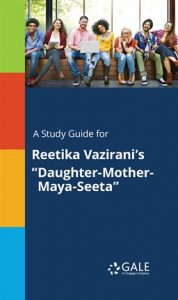 “On the outside, she seemed pretty calm. But from what she was telling me, I could see she was disturbed. At times there were tears in her eyes,” D’Silva remembers. After 39 years in the priesthood, he thought he could recognize depression. He asked Reetika, several times, to make no decisions that could harm her — “Put things on hold” — and she agreed. He promised to locate and lend her a book, Spiritual Help for Depression.
“On the outside, she seemed pretty calm. But from what she was telling me, I could see she was disturbed. At times there were tears in her eyes,” D’Silva remembers. After 39 years in the priesthood, he thought he could recognize depression. He asked Reetika, several times, to make no decisions that could harm her — “Put things on hold” — and she agreed. He promised to locate and lend her a book, Spiritual Help for Depression.
Wednesday, July 16. Reetika awakened her friend Diane Taylor with a 7:15 a.m. call. “Diane, I’m going to hurt myself and Jehan,” she said in a whispery voice. Call the suicide hot line right now, Taylor urged.
“No, they’ll put me on drugs, and they’ll put me in the hospital,” Reetika said.
“No, they won’t.”
“Yes, yes, they will.”
Then call that minister you know there, Taylor said, changing tactics, and call me right back.
But the minister, Denise King-Miller, was out and didn’t hear Reetika’s message, “I think I’m going to hurt myself,” until several hours later.
An acquaintance Reetika was scheduled to lunch with on Thursday also got a confusing call. She was having an “emergency,” Reetika said, so the woman, a poet who knew Jane Shore and had a key to the house, should just let herself in. Her apparent role was to discover the bodies.
July 16 was the last day of her life. The bodies of Reetika and her son were found on July 18. The medical reports said method of murder was stabbing with knife. She committed suicide by slashing her own wrist with a kitchen knife. Child’s death was more violent. The child suffered stab wounds to his chest, neck and forearm, which penetrated his lungs and his heart.
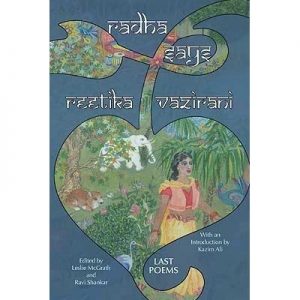 Posthumous Book
Posthumous Book
Reetika Vazirani’s posthumous collection of poetry ‘Radha Says’, was published in 2009.
____________________
Courtesy: Murder Pedia, Encyclopedia, Blogs of Death, India Unfinished, Poets.org, Kavishala